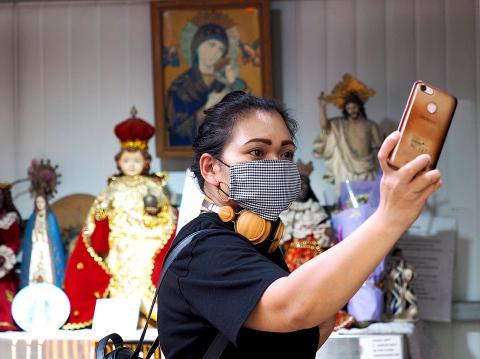The leaders of Women’s Aid and the Women’s Equality party are among the signatories to an open letter calling on Oxford University Press (OUP) to change its dictionaries’ “sexist” definitions of the word “woman.”
The letter points out that some Oxford Dictionaries’ definitions of the word include synonyms such as “bitch” and “maid,” and says that derogatory and sexist examples of usage include: “God, woman. Will you just listen?”
The definitions for “man,” meanwhile, include “a person with the qualities associated with males, such as bravery, spirit or toughness.”

Photo: EPA-EFE
“Bitch is not a synonym for woman. It is dehumanizing to call a woman a bitch. It is but one sad, albeit extremely damaging, example of everyday sexism. And that should be explained clearly in the dictionary entry used to describe us,” says the letter, which is asking OUP, which publishes the Oxford Dictionary of English, as well as the online Oxford Dictionaries, to change their entries.
The letter, published in time for International Women’s Day on March 8, is the latest move in a campaign that was launched last year by Maria Beatrice Giovanardi. Giovanardi’s petition calling for a change to the dictionary’s definition of woman has now been signed by more than 30,000 people. On Tuesday, she said that she hoped having the backing of women’s rights campaigners and linguists would strengthen the message.
The Oxford Dictionary of English is the source licensed by Apple and Google, meaning that when users search for the definition of woman on either, they are given a list of “similar” words including chick, bint, popsy, wifie, besom, wench and maid. Terms such as piece, bit, mare, baggage and bitch are labelled derogatory and offensive by the dictionary, but words including bint and wench are not.
“It might not end everyday sexism or the patriarchy but it’s a good start,” says the letter, which is also signed by linguists and academics as well as Mandu Reid, leader of the Women’s Equality party, Deborah Cameron, professor of language and communication at Oxford and Nicki Norman, acting chief executive of the Women’s Aid Federation of England.
“Synonyms and examples, such as these, when offered without context, reinforce negative stereotypes about women and centre men. That’s dangerous because language has real world implications, it shapes perceptions and influences the way women are treated,” the letter continues.
A spokeswoman for OUP said the company had finished reviewing the dictionary and thesaurus entries for terms for women and girls, and that changes, including more labels that show certain terms are offensive or dated, would be “visible across various platforms in the next few weeks.”
“Our dictionaries reflect rather than dictate how language is used. This is driven solely by evidence of how real people use English in their daily lives. This independent editorial approach means that our dictionaries provide an accurate representation of language, even where it means recording senses and example uses of words that are offensive or derogatory, and which we wouldn’t necessarily employ ourselves. In cases where words and uses may be considered offensive, they are clearly labelled as such. This helps our readers to understand the connotations of terms when looking them up and also acts as a lasting record of the way in which language evolves,” the spokeswoman said.

In the next few months tough decisions will need to be made by the Taiwan People’s Party (TPP) and their pan-blue allies in the Chinese Nationalist Party (KMT). It will reveal just how real their alliance is with actual power at stake. Party founder Ko Wen-je (柯文哲) faced these tough questions, which we explored in part one of this series, “Ko Wen-je, the KMT’s prickly ally,” (Aug. 16, page 12). Ko was open to cooperation, but on his terms. He openly fretted about being “swallowed up” by the KMT, and was keenly aware of the experience of the People’s First Party

Aug. 25 to Aug. 31 Although Mr. Lin (林) had been married to his Japanese wife for a decade, their union was never legally recognized — and even their daughter was officially deemed illegitimate. During the first half of Japanese rule in Taiwan, only marriages between Japanese men and Taiwanese women were valid, unless the Taiwanese husband formally joined a Japanese household. In 1920, Lin took his frustrations directly to the Ministry of Home Affairs: “Since Japan took possession of Taiwan, we have obeyed the government’s directives and committed ourselves to breaking old Qing-era customs. Yet ... our marriages remain unrecognized,

During the Metal Ages, prior to the arrival of the Dutch and Chinese, a great shift took place in indigenous material culture. Glass and agate beads, introduced after 400BC, completely replaced Taiwanese nephrite (jade) as the ornamental materials of choice, anthropologist Liu Jiun-Yu (劉俊昱) of the University of Washington wrote in a 2023 article. He added of the island’s modern indigenous peoples: “They are the descendants of prehistoric Formosans but have no nephrite-using cultures.” Moderns squint at that dynamic era of trade and cultural change through the mutually supporting lenses of later settler-colonialism and imperial power, which treated the indigenous as

Standing on top of a small mountain, Kim Seung-ho gazes out over an expanse of paddy fields glowing in their autumn gold, the ripening grains swaying gently in the wind. In the distance, North Korea stretches beyond the horizon. “It’s so peaceful,” says the director of the DMZ Ecology Research Institute. “Over there, it used to be an artillery range, but since they stopped firing, the nature has become so beautiful.” The land before him is the demilitarized zone, or DMZ, a strip of land that runs across the Korean peninsula, dividing North and South Korea roughly along the 38th parallel north. This